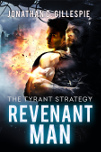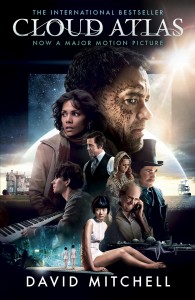Review: Cloud Atlas, by David Mitchell
March 17, 2016 in General Topics
All this means Cloud Atlas is an incredible gamble on Mitchell’s part, and a difficult book to recommend to most readers. A rare soul embraces all the genres present, and as such they’re being expected to slog through long tracts of the novel they might find evoke ennui. It’s almost like someone recruited six different authors, gave them some ground rules, then published an anthology of the results.
That Mitchell pulled off such a convincing feat is impressive, yes, but readers more interested in plot and pacing are going to walk away disappointed, in my opinion. Plus, even those of us willing to put up with what can fairly be called self-indulgence are likely going to end up thinking individual segments just didn’t work. I found redeeming qualities in each of Mitchell’s landscapes, but I would have gladly spent less time in some of them. My ranking, from best to worst, is:
1. An Orison of Sonmi~451
2. Sloosha’s Crossin’ an’ Ev’rythin’ After
3. Half-Lives: The First Luisa Rey Mystery
4. The Ghastly Ordeal of Timothy Cavendish
5. The Pacific Journal of Adam Ewing
6. Letters from Zedelghem
Consider that though Mitchell moves with a master’s ease in tone and style between these tales, I still found major issues with the broader result as a whole. Mitchell chooses, for stylistic reasons, to accurately match the pentameter and pace of writings from their respective time periods. This means that for Sonmi~451, a future clone slave called a fabricant, everything moves with an economy of words. This makes perfect sense for someone created to function as a servant at a restaurant; a person to whom efficiency and speed are more valuable than mulling over every detail.
But for “Letters from Zedelghem” in particular–and Adam Ewing’s island hopping in general–pacing suffers. It isn’t just deficient in the sense that those weren’t my favorite genres, either. I actually enjoyed tracts of Ewing’s journey. No, I’d argue that the author didn’t cut enough extraneous filler in both. Zedelghem is like a road trip chaperoned by someone who keeps veering off for roadside attractions. There comes a point where we’re saturated by beauty and simply wish to make forward progress. I’d have cut roughly half of it.
Mind you, other readers might ding me on this point and accuse me of not grasping all the subtle touchbacks to the grand ideas and philosophies Mitchell wants to portray. I’d argue there’s a better way to critique corporatism, meditate on the war of man’s base desires verses his better self, and foist the idea that subjugation transcends generations and simply changes form to adapt to each epoch. There’s a mode available to Mitchell–focusing on plot, first–that he chose not to pursue because he wanted to create a piece of art. Many of the component parts of this novel resolve too quickly and conveniently after having their central flesh sacrificed to that ambition, as well. That chaperone I mentioned earlier crops up all over this book. Often he seems to suddenly realize he’ll be late and puts the pedal to the floor.
I wrestled with what rating to choose. How do I quantify a novel that is both an incredible achievement, yet one I often didn’t often look forward to picking up? That didn’t seem to come into its own until nearly its half-way point?
I think we must still judge the unconventional on the basis of its results. I respect the unique. I can applaud the engineering feat that is the rotary engine. I can appreciate Wuthering Heights for being a brooding tale of revenge and denied love, well-ahead of its time. I like music that comes from the bleeding edge.
But I’m also the first to tell you said engine returns lousy fuel economy, Wuthering Heights is so rich with subtext that it moves at a snail’s pace, and Tool crams their albums with metaphysical tracks that underscore the whole at the expense of the part.
Robert Frobisher, protagonist of what I maintain to be this novel’s most troubled segment, creates a composition called the “Cloud Atlas Sextet” he believes is his best work. Frobisher makes a choice to put his art above everything else, even his love, even his happiness. In a sense, he’s leaping at perfection in the name of everything else he could have created.
That’s Mitchell’s novel summed up. It’s a wonder to watch a composer strive for an opus, but none of us are obligated to love said symphony simply because he did so. And I did not.
Rating: 2/5 stars
![]() A young couple’s miracle at the last star left in the Universe will lead to a specter from the past returning to confront mankind…and the end will become the beginning. Try Part I of the Beacon Saga Serial, for your choice of ebook platforms.
A young couple’s miracle at the last star left in the Universe will lead to a specter from the past returning to confront mankind…and the end will become the beginning. Try Part I of the Beacon Saga Serial, for your choice of ebook platforms.


Recent Discussion